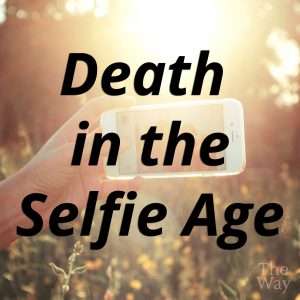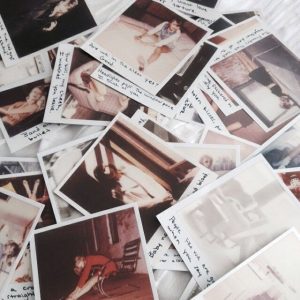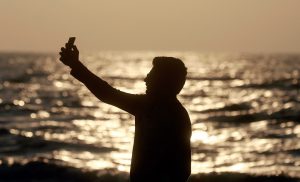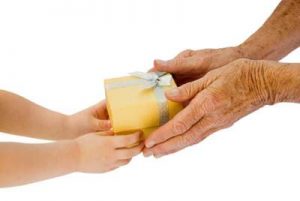
25,700 photographs to chronicle one life.
Photographs of all the firsts: teeth, steps, days of school. Photographs of the most significant days: weddings, graduations, birthday celebrations. But also photographs of the most routine days, of the most common activities: taking a walk, eating a meal, hanging out with a friend.
Imagine them piled somewhere – overflowing thousands of albums or stuffed in dozens of bins, cycling on a lengthy loop projected onto a large screen.
 These are not 25,700 photos taken by media sources; they are not the pictures of celebrities, politicians, or anyone famous.
These are not 25,700 photos taken by media sources; they are not the pictures of celebrities, politicians, or anyone famous.
These are photos of one typical Western person born during the 1980s or 1990s.
25,700 selfies – the average number estimated to be taken by a millennial today.
One person, one life; 25,700 pictures.
Many concerns are raised about statistics like these. Does so much picture taking and sharing promote vanity?
Do selfies create narcissim?
There are even statistics available that indicate the physical dangers that can occur during the practice of taking a self-portrait photograph; apparently, this habit is more deadly than are shark attacks.
My interest is in something deadly in another way – the death of our ability to experience life as we are chronicling it. And specifically, I wonder what effect that may have on our dying.

What is it like to die in the Selfie Age?
I watch with fascination people around me capturing their experiences and sharing them even as these experiences are occurring. Many people take pictures of themselves and post to social media sources throughout each day of their lives, it seems: pictures of what they eat and of their hairstyles; pictures of them with family members, with friends, with their pets; pictures constructed to tell a story of their life.
These images appear everywhere – images taken at arms length, usually from an angle that shows the most flattering view, often manipulated through computer applications to show something quite different from the original.
When the subject of a set of those 25,700 photographs dies, what role will these selfies play in the memory of that subject? Will these lives be viewed through the lens of the selfie?
There is a tradition that holds that each of us dies twice. Our first death is that of our physical body. Our second, more final, death occurs when the last person who remembers us dies. This is the death of something much more ephemeral than our physical form, even less fixed than our spiritual bodies – it is the death of the memory of us. Although it is something over which we have absolutely no control, it is obviously of huge importance to humans. And this importance can lead to obsessive grasping; we cling to the relationships, to the identities we have constructed, and even to the objects we think signify these relationships and identities. We may study an artifact in hopes of proving someone’s existence (or even our own); we may convince ourselves that we then know or understand the person or relationship memorialized by the object. However, it will never bring us closer to the person or the relationship. Indeed, all such images – physical and otherwise – can form barriers to truly relating, to truly being.
So what about selfies? Will those of the millennial generation finally die their second deaths when the last of their selfies is destroyed?
Years ago, I asked an elderly woman who was suffering with chronic health conditions, “Are you happy with how your life is right now?” Her answer was, “Well, I don’t want to be remembered this way.” For years, it seemed she had been willing herself to die. Suffering as much spiritually and emotionally as she was physically, she spent most of her days in bed, senses dulled by pain medication. Concerned at her lack of presence, I became more direct with my question, “I’m asking you about YOU and YOUR LIFE. At the end of the day, can you look back and be content or at least at peace with the way it has gone?” She continued to repeat the same answer, “Well, I just don’t want to be remembered this way.”
Although I remained concerned that she was fixated on this one idea, I also had great compassion for her. I too have spent time repeating similar phrases, albeit to myself rather than aloud. “Is this what I want other people to know about me after I die?” “How would I like to be remembered?” And, early on, “Will my children remember me at all?”
Challenges surrounding issues of identity are experienced acutely by almost everyone who is dying. In life, much of our thoughts and efforts cluster around constructions of identity: Who I am? What do I do in the world? With whom do I relate? We spend much of our time fashioning social masks, each of which forms a different lens in the kaleidoscope of our identity.
 Today, those masks are shared with the world through each of those 25,700 selfies.
Today, those masks are shared with the world through each of those 25,700 selfies.
Of my three death walks, the one during which I spent the most time in the realm of these issues of image and identity was likely the second time I was faced with physical death. Plunged into congestive heart failure immediately following my daughter’s birth, I filled hours – days and weeks, even – obsessed about the image of me that would be left for this little girl. If this were happening today, I likely would be taking lots of selfies, so that she could someday visualize what her mother had looked like. But would those pictures help her better know a mother who was no longer with her?
As we spent long nights on the couch, her nursing and me coughing, I felt tremendous grief that my daughter might never know me. Her older brother may maintain bits of memory of his mother, but this infant would not. If I died, what she would experience of me would all be based on constructs – a mother pieced together through other people’s memories, through photographs and miscellaneous memorabilia. As I had when I was dying during her brother’s early life, I wondered if I perhaps should write her letters, tape videos for her, leave her instructions and bits of wisdom. I had read of many parents doing this, and it seemed a beautiful gift to leave.
 “But would it be truly a gift?” I began to wonder. I did not know this little girl at eight or at eighteen. I knew her only in this moment. How could I construct a relationship with someone who did not yet exist? And how challenging would it be for her to relate to someone who no longer existed? For me, releasing the desire to leave behind an image of myself was challenging, and it was absolutely the way to peace.
“But would it be truly a gift?” I began to wonder. I did not know this little girl at eight or at eighteen. I knew her only in this moment. How could I construct a relationship with someone who did not yet exist? And how challenging would it be for her to relate to someone who no longer existed? For me, releasing the desire to leave behind an image of myself was challenging, and it was absolutely the way to peace.
Paul Kalanithi, the young physician whose When Breath Becomes Air beautifully shares his dying experience, expressed similar uncertainties in relationship to his infant daughter:
Yet one thing cannot be robbed of her futurity: my daughter, Cady. I hope I’ll live long enough that she has some memory of me. Words have a longevity I do not. I had thought I could leave her a series of letters — but what would they really say? I don’t know what this girl will be like when she is 15; I don’t even know if she’ll take to the nickname we’ve given her. http://bit.ly/1sY6H8P
While realizing the futility of trying to create a relationship with the future child who is now an infant may see obvious, it really is no different from trying to create a relationship with the future of any person. Relationships exist in the present moment.
My father’s house burned down when he was a teenager; as a result, there are only a few pictures that exist of his mother, who died when he was just a toddler. On family visits to his hometown, people would often remark how much I looked like my grandmother, whom I had never met and whom my father could not remember. His older brother, who remembered his mother’s face quite clearly, frequently stared into my eyes and commented on how much they resembled hers. That sometimes made me sad; I felt disappointed not ever to get to see someone who, through the wonders of DNA, looked so much like me, an occurrence I had never before experienced. Other times, I was quite happy to know that someone in my family looked like me, that green eyes were not such an oddity. And at those times I deeply longed to see a picture of her. But when I finally did see a photograph of my grandmother, I was struck by the realization that it was just an image; it did not help me understand this woman or know her or feel connected with her. It could not be a physical manifestation of a relationship, because there was no relationship — not in the way my childhood mind was constructing one.
The photograph was a symbol of my grandmother; it was not my grandmother.

Each of those 25,700 selfies taken by a millennial today is such a symbol. Does it help those of us left behind after a loved one’s death better remember that person?
Maybe it does. The Spanish word recuerdo can mean either memory or souvenir, indicating the ways in which objects can be imbued with meaning when they are associated with strong memories.
Palliative care physician Ira Byock has found that “The specter of death reveals our relationships to be our most precious possessions” (The Four Things that Matter Most: A Book About Living). Yet we cling to the possessions that we think will represent us and those relationships once we have died. And my concern is that we are so busy making those objects today that we may not be focused on the experiences that will one day become the memories.
Perhaps death itself is something that can nudge us to put down the camera for just one moment and actually live. Rabbi Zalman Schachter-Shalomi and Ronald Miller note that often the “intrusion of thanatos (death)” allows us to locate the self that “dwells behind the mask of our persona”, the truth of who we are underneath all the constructs of who we think we are and who we present ourselves as (From Age-ing to Sage-ing: A Profound Vision of Growing Older).
Kalanithi’s wisdom again encourages me; here he addresses his infant daughter:
That message is simple: When you come to one of the many moments in life when you must give an account of yourself, provide a ledger of what you have been, and done, and meant to the world, do not, I pray, discount that you filled a dying man’s days with a sated joy, a joy unknown to me in all my prior years, a joy that does not hunger for more and more, but rests, satisfied. In this time, right now, that is an enormous thing. (http://stan.md/1zA8kWr to watch a short video about Kalanithi’s work, see http://bit.ly/2rYMm7h)
What if each of us could experience and share that kind of joy – one that does not hunger for more and more, one that needs no representation to prove it was here, one that rests in this moment?

I frequently admonish my children to put down their phones, to be present rather than to focus on representing the present. To live from the inside out rather than the outside in, which is the focus of selfies and social media postings. “Mama, you just don’t get it,” they tell me, “Everyone does this.”
They’re right – almost all of their peers do “do this”. And I just don’t get it. And that’s part of the life they will perhaps remember – a mother hopelessly out of touch with some of the contemporary trends in her culture. A mother who consistently repeated the phrase, “presence, please,” to herself and her loved ones.
Or maybe they won’t remember. That’s the thing – we don’t get to choose the legacy we leave behind. As much as we would like to create an image, an identity, these constructs are simply that – masks covering who we are. They sometimes reveal a bit of us, sometimes hide us entirely.
People have always created constructions of themselves. Today, those constructions may be more in our faces – taken at arms length from a very flattering angle and modified digitally. But perhaps they are no different from the effigies in stone that wealthy people in the ancient world had created of themselves. Maybe they will just form incredibly long obituaries once someone dies.
To focus on the mask rather than on what lies underneath, to view ourselves always from the outside rather than to live from the inside – these are some of the challenges of being human. Our work, it seems to me, is to not confuse the effigy with the person, to not become so focused on creating these chronicles of our lives that we forget to live those lives.

4 comments to “Death in the Selfie Age”
You can leave a reply or Trackback this post.
Susan Wesley Hartley - June 26, 2017 at 6:57 pm
Amy. This speaks powerfully to me as I seek to cherish and live and not cling to the experiences of the visits of my grandchildren and simultaneously explore the letters, chronicles, photos of my parents and grandparents and generations before. Thru the gift of the centering prayer practice I am building relationships way beyond my wildest imagination. Ephesians 3: 20 – 21.
In this liminal place of building a new revised relationship with my hopefully truer self I seek to be faithful to Love’s gift as I accept the gift of your wisdom.
Amy Agape - June 26, 2017 at 6:59 pm
Ah, yes, Susan, I know well that movement to cherish and live and not cling. Thank you for reading and responding ~ and for living in the moment!
Kathy Rains - July 13, 2017 at 3:55 pm
Thanks Amy, I agree with you to live the experience. I learned that after my husband’s death. It opened my eyes and heart to cherish what is right in front of me in the present moment and be thankful. The clinging just brings anxiousness and pain for me.
Amy Agape - July 13, 2017 at 6:03 pm
Thank you for reading and commenting, Kathy! I have the same experience with the clinging.